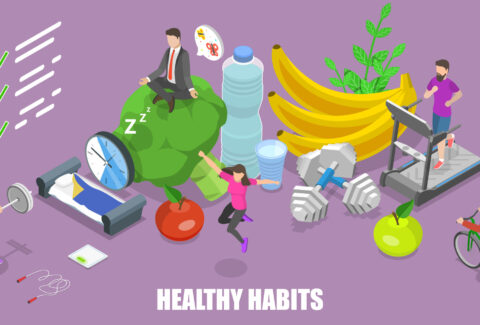Digital Detox: How Reducing Screen Time Can Improve Your Sleep, Mood, and Focus
Screens are everywhere—from smartphones to laptops to televisions. While technology is an essential part of modern life, excessive screen time can negatively impact sleep, mental health, and cognitive function. The constant notifications, social media scrolling, and blue light exposure can lead to fatigue, anxiety, and poor concentration.
Taking control of screen usage through a digital detox can help you feel more energized, focused, and emotionally balanced. Many of the healthy habits covered in 5 Small Changes to Build Healthy Habits That Last a Lifetime emphasize the importance of reducing screen time to improve overall well-being. Let’s explore how cutting back on screens can transform your sleep, mood, and focus.
The Science Behind Screen Time and Sleep Disruption
Sleep is one of the first things to suffer when screen time increases. The blue light emitted by screens interferes with melatonin production, making it harder to fall asleep and stay asleep.
How Screen Time Disrupts Sleep:
- Suppresses melatonin – The hormone responsible for regulating sleep cycles.
- Increases alertness – Social media and online content keep the brain active when it should be winding down.
- Delays REM sleep – Affects sleep quality and cognitive recovery.
“Better sleep starts with less screen exposure—give your brain time to unwind.”
For more tips on improving sleep naturally, check out The Sleep Cheat Code: How Better Rest Boosts Your Energy, Mood, and Health.
The Impact of Screen Time on Mental Health
Excessive screen time is linked to increased stress, anxiety, and even depression. Constant exposure to curated online content can lead to negative self-comparisons, while social media notifications create an endless loop of dopamine-driven distractions.
How Reducing Screen Time Improves Mental Health:
- Lowers anxiety and stress – Less exposure to negative online content.
- Reduces social comparison – Encourages self-acceptance and confidence.
- Increases mindfulness – More time for real-world interactions and self-care.
“Less screen time, more peace—disconnect to reconnect with yourself.”
For additional stress-management techniques, visit Why Stress Sucks for Your Health and How to Manage It.
The Connection Between Screen Time and Focus
Do you ever find it hard to concentrate after hours of scrolling? That’s because excessive screen use weakens attention span and makes it harder for the brain to process information efficiently.
Why Screen Overload Hurts Focus:
- Increases mental fatigue – Too much information at once overwhelms the brain.
- Encourages multitasking – Reduces efficiency and deep work capabilities.
- Creates dopamine addiction – Makes it harder to engage in low-stimulation activities like reading or studying.
“Your brain thrives on focus—give it a break from digital distractions.”
Pairing screen reduction with Why Exercise is the Ultimate Power-Up for Teens can further enhance focus and mental clarity.
How to Start a Digital Detox
A digital detox doesn’t mean eliminating screens entirely. It’s about setting boundaries and being mindful of usage.
Simple Steps to Reduce Screen Time:
- Set screen-free zones – Keep devices out of bedrooms and mealtimes.
- Use blue light filters – Reduce eye strain and protect sleep quality.
- Schedule tech-free breaks – Take short digital detoxes throughout the day.
- Engage in offline hobbies – Replace screen time with reading, exercise, or socializing.
“Small digital breaks lead to big improvements in sleep, focus, and well-being.”
For additional habit-building strategies, explore The Science of Habit Formation: How to Make Healthy Changes Stick.
The Link Between Screen Time and Physical Health
Beyond sleep and mental health, excessive screen time affects physical health as well. Poor posture, eye strain, and a sedentary lifestyle contribute to long-term issues like headaches, muscle stiffness, and even cardiovascular disease.
How Reducing Screen Time Benefits Your Body:
- Prevents eye strain – Reduces headaches and dry eyes.
- Improves posture – Less time hunched over screens means better spinal health.
- Encourages movement – More opportunities to be physically active.
“Your body needs movement—step away from the screen and get active!”
For movement inspiration, check out How Moving More Can Improve Your Mental and Physical Health and discover how an active lifestyle helps counteract the negative effects of excessive screen time.
How Social Connections Improve Without Screens
Overuse of digital devices can weaken real-life social interactions. While technology helps us stay connected, face-to-face conversations foster deeper emotional connections and stronger relationships.
Benefits of Less Screen Time in Social Life:
- Improves communication skills – More face-to-face interactions.
- Strengthens relationships – Reduces distractions during quality time.
- Encourages presence – Helps you fully engage in moments with loved ones.
“Put your phone down—life’s best moments happen offline.”
If you want to enhance your relationships and well-being, learn more in How Social Connections Impact Your Health.
The Bottom Line: Balance, Not Elimination
A digital detox is not about avoiding technology altogether—it’s about creating balance. By being intentional with screen use, you can improve sleep, mental health, focus, and relationships.
If you’re looking for more ways to build a healthier lifestyle, check out 5 Small Changes to Build Healthy Habits That Last a Lifetime and start making small but meaningful adjustments today.
What’s one step you’ll take today to reduce screen time? Share your digital detox tips with us on social media and inspire others to find balance in the digital age!








